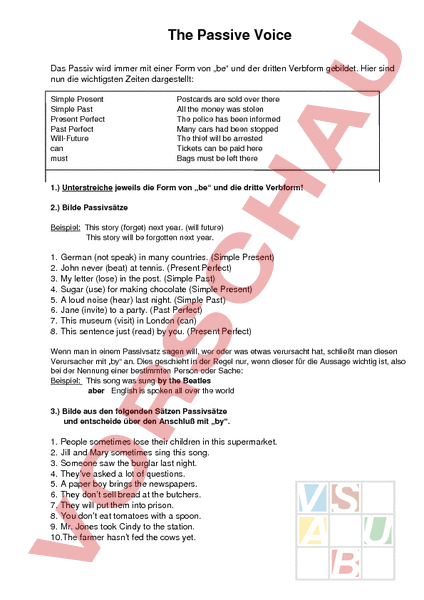Arbeitsblatt: Passiv im Englisch Unit 29 RfE 3
Material-Details
Theorie und Übungen mit Lösungen zum Passiv.
Englisch
Grammatik
9. Schuljahr
4 Seiten
Statistik
81029
1266
12
06.05.2011
Autor/in
Pasci (Spitzname)
Land: Schweiz
Registriert vor 2006
Textauszüge aus dem Inhalt:
The Passive Voice Das Passiv wird immer mit einer Form von „be und der dritten Verbform gebildet. Hier sind nun die wichtigsten Zeiten dargestellt: Simple Present Simple Past Present Perfect Past Perfect WillFuture can must Postcards are sold over there All the money was stolen The police has been informed Many cars had been stopped The thief will be arrested Tickets can be paid here Bags must be left there 1.) Unterstreiche jeweils die Form von „be und die dritte Verbform! 2.) Bilde Passivsätze Beispiel: This story (forget) next year. (will future) This story will be forgotten next year. 1. 2. 3. 4. 5. 6. 7. 8. German (not speak) in many countries. (Simple Present) John never (beat) at tennis. (Present Perfect) My letter (lose) in the post. (Simple Past) Sugar (use) for making chocolate (Simple Present) loud noise (hear) last night. (Simple Past) Jane (invite) to party. (Past Perfect) This museum (visit) in London (can) This sentence just (read) by you. (Present Perfect) Wenn man in einem Passivsatz sagen will, wer oder was etwas verursacht hat, schließt man diesen Verursacher mit „by an. Dies geschieht in der Regel nur, wenn dieser für die Aussage wichtig ist, also bei der Nennung einer bestimmten Person oder Sache: Beispiel: This song was sung by the Beatles aber English is spoken all over the world 3.) Bilde aus den folgenden Sätzen Passivsätze und entscheide über den Anschluß mit „by. 1. People sometimes lose their children in this supermarket. 2. Jill and Mary sometimes sing this song. 3. Someone saw the burglar last night. 4. Theyve asked lot of questions. 5. paper boy brings the newspapers. 6. They dont sell bread at the butchers. 7. They will put them into prison. 8. You dont eat tomatoes with spoon. 9. Mr. Jones took Cindy to the station. 10.The farmer hasnt fed the cows yet. The Passive Voice Das Passiv wird immer mit einer Form von „be und der dritten Verbform gebildet. Hier sind nun die wichtigsten Zeiten dargestellt: Simple Present Simple Past Present Perfect Past Perfect WillFuture can must Postcards are sold over there All the money was stolen The police has been informed Many cars had been stopped The thief will be arrested Tickets can be paid here Bags must be left there 1.) Unterstreiche jeweils die Form von „be und die dritte Verbform! 2.) Bilde Passivsätze Beispiel: This story (forget) next year. (will future) This story will be forgotten next year. 1. 2. 3. 4. 5. 6. 7. German isnt spoken in many countries. (Simple Present) John has never been beaten at tennis. (Present Perfect) My letter was lost in the post. (Simple Past) Sugar is used for making chocolate (Simple Present) loud noise was heard last night. (Simple Past) Jane had been invited to party. (Past Perfect) This museum can be visited in London (can) Wenn man in einem Passivsatz sagen will, wer oder was etwas verursacht hat, schließt man diesen Verursacher mit „by an. Dies geschieht in der Regel nur, wenn dieser für die Aussage wichtig ist, also bei der Nennung einer bestimmten Person oder Sache: Beispiel: This song was sung by the Beatles aber English is spoken all over the world 3.) Bilde aus den folgenden Sätzen Passivsätze und entscheide über den Anschluß mit „by. 1. Children are sometimes lost in this supermarket. 2. This song is sometimes sung by Jill and Mary. 3. The burglar was seen last night. 4. lot of questions have been asked. 5. The newspapers were brought. 6. Bread isnt sold at the butchers. The Passive Voice 7. They will be put into prison. 8. Tomatoes arent eaten with spoon. 9. Cindy was taken to the station by Mr. Jones. 10.The cows havent been fed yet (by the farmer). Exercises Put into the Passive Voice 1. Simon bought motorbike last week. 2. The boy scout helped the old lady. 3. Mrs Scott will type the letters tomorrow. 4, In Austria the people speak German. 5. thunderstorm destroyed most of the houses. 6. The housewife hadnt tried the recipe before. 7. My sister has given me the necklace as present. Put into the Active Voice 1. This book will be translated by me. 2. The plants have already been watered by Mrs Cool. 3. The old trunk had not been opened before. 4. The discovery was made yesterday. 5. The population had been warned by the police. The Passive Voice Translate the following sentences 1. Nächstes Jahr wird das neue Kaufhaus eröffnet. 2. Free soup was given to the poor by the church. 3. Three banks have been robbed here by criminals since last June. Put into the Passive Voice 1. motorbike was bought by Simon last week. 2. The old lady was helped by the boy scout. 3. The letters will be typed by Mrs Scott tomorrow. 4. German is spoken by the people in Austria. 5. Most of the houses were destroyed by thunderstorm. 6. The recipe hadnt been tried by the housewife before. 7. The necklace has been given to me by my sister as present. Put into the Active Voice 1. will translate the book. 2. Mrs Coll has already watered the plants. 3. We hadnt opened the old trunk before. 4. Yesterday they made the discovery. 5. The police had warned the population. Translate the following sentences 1. Next year the shopping centre will be opened. 2. Den Armen wurde kostenlose Suppe von der Kirche gegeben. The Passive Voice 3. Die Banken hier sind seit letzen Juni von Kriminellen ausgeraubt worden.
